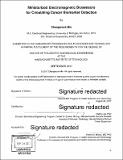| dc.contributor.advisor | Hakho Lee. | en_US |
| dc.contributor.author | Min, Changwook | en_US |
| dc.contributor.other | Harvard--MIT Program in Health Sciences and Technology. | en_US |
| dc.date.accessioned | 2018-02-16T20:05:46Z | |
| dc.date.available | 2018-02-16T20:05:46Z | |
| dc.date.copyright | 2017 | en_US |
| dc.date.issued | 2017 | en_US |
| dc.identifier.uri | http://hdl.handle.net/1721.1/113786 | |
| dc.description | Thesis: Ph. D. in Biomedical Engineering, Harvard-MIT Program in Health Sciences and Technology, 2017. | en_US |
| dc.description | Cataloged from PDF version of thesis. | en_US |
| dc.description | Includes bibliographical references (pages 113-120). | en_US |
| dc.description.abstract | Cancer is one of leading cause of deaths, and responsible for 8.2 million deaths worldwide. Especially, 70% of deaths from cancer occur in low or mid income countries. In order to deliver affordable and accessible cancer care to low income developing countries, it is critical to develop rapid, low cost, and highly accurate tools for cancer detection and treatment. Recently, liquid biopsy and circulating cancer biomarkers such as circulating tumor cells (CTC), extracellular vesicles (EV), and cell free DNA (cfDNA) have gained great attentions for early diagnosis, prognosis, and treatment monitoring of cancer patients because they can be accessed in less invasive approaches through body fluids while providing quantitative information about original tumors at low cost. To facilitate detection of circulating cancer biomarkers, we developed electromagnetic biosensing systems for rapid and quantitative molecular analysis. First, we report portable nuclear magnetic resonance (NMR) system that detects cancer cells or proteins labelled with magnetic nanoparticles (MNPs). The developed NMR system could detect as low as 20 cancer cells in 5 uL samples. Second, we describe micro-Hall magnetometer that molecularly profiles single cancer cell with magnetic multiplexing. The micro-Hall magnetometer, which consisted of an array of 7 um x 7 um Hall sensors, showed its capability to differentiate magnetic particles with distinct magnetic moments. We applied this technology to molecular profiling of single ovarian cancer cell. Last, we introduce wirelessly powered electrochemical system that detect cancer specific EV and DNA. Using immuno-magnetic sandwich assay, we could enrich almost 100% of EVs from clinical specimens without ultracentrifugation and profile cancer specific transmembrane proteins from as low as 105 EVs. Also, we demonstrated PCR-free detection of single stranded DNA with in-vitro protein synthesis assay. These electromagnetic biosensors will be powerful tools to deliver more accessible and affordable cancer care to resource limited areas in developing countries. | en_US |
| dc.description.statementofresponsibility | by Changwook Min. | en_US |
| dc.format.extent | x, 120 pages | en_US |
| dc.language.iso | eng | en_US |
| dc.publisher | Massachusetts Institute of Technology | en_US |
| dc.rights | MIT theses are protected by copyright. They may be viewed, downloaded, or printed from this source but further reproduction or distribution in any format is prohibited without written permission. | en_US |
| dc.rights.uri | http://dspace.mit.edu/handle/1721.1/7582 | en_US |
| dc.subject | Harvard--MIT Program in Health Sciences and Technology. | en_US |
| dc.title | Miniaturized electromagnetic biosensors for circulating cancer biomarker detection | en_US |
| dc.type | Thesis | en_US |
| dc.description.degree | Ph. D. in Biomedical Engineering | en_US |
| dc.contributor.department | Harvard University--MIT Division of Health Sciences and Technology | |
| dc.identifier.oclc | 1022845818 | en_US |
